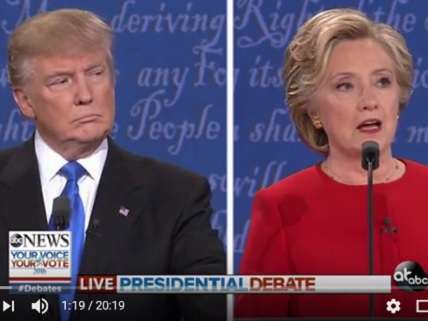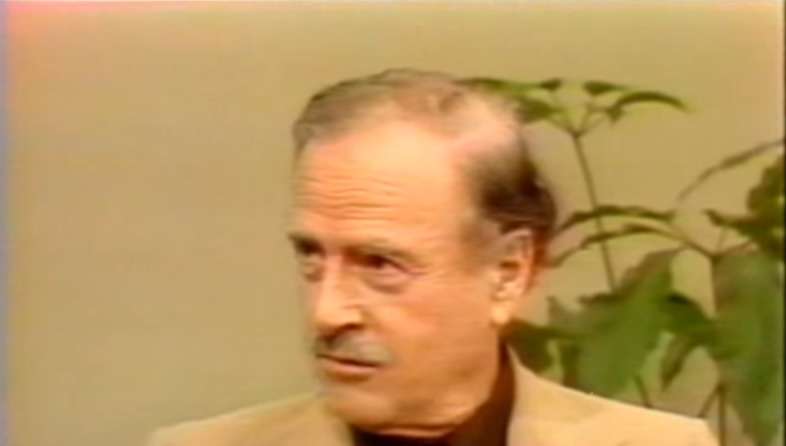Next Time, Make Trump and Clinton - And Johnson and Stein! - Answer Each Other's Questions
Why do we insist on using the "most stupid arrangement of any debate in the history of debating" for presidential candidates?

During a 1976 presidential debate between President Gerald Ford and challenger Jimmy Carter—a dreary affair, as were both their presidencies—the audio died, leading to some of the most-embarrassing dead air in the history of American politics.
On the next morning's Today Show, the media theorist Marshall McLuhan was invited to talk with host Tom Brokaw and NBC analyst Edwin Newman about the debate, which was the first presidential debate since Richard Nixon and John Kennedy squared off in 1960. McLuhan minced no words, calling the format "the most stupid arrangement of any debate in the history of debating." Indeed, McLuhan even half-jokingly blamed the technical difficulties on the idea that the machines had gone on strike rather be party to such an awful display ("the medium," he said, "had gone on revolt against the bloody message").
About the best thing you can say about the first debate between Hillary Clinton and Donald Trump is that these days, the machines know their place. But McLuhan's hair probably would have caught on fire watching this spectacle, and for good reason. Let's leave aside for the moment the obvious point that the stage was missing at least one and probably two candidates, Libertarian Gary Johnson and Green Jill Stein, who should have been included.
Instead, let's simply focus on the brutal reality that after 90 minutes of back and forth, nobody knows anything more about either candidate than he or she knew going in. The format, essentially the same as the one that angered McLuhan so much back during the Bicentennial Year, precludes any sort of meaningful, candidate-driven questioning. The moderator, NBC's Lester Holt, is a good guy and a decent journalist, but what do we really gain by letting a single journalist write the questions and try to direct traffic? Trump and Clinton talked over each other and ran up and down the alleys of topics like bored kids running up and down the aisles during a Wagner opera.
It would be far better if the two candidates were forced to interrogate one another on whatever issues or topics they want to. That way, we'd not only get a sense of what they stand for from their answers but also from the questions they felt compelled to ask of one another. Instead, tonight we simply heard rehearsed answers about stock questions, many of which are intensely inconsequential. Consider the amount of time wasted discussing Donald Trump's tax returns. No candidate is obligated to release the documents, though most do (Gerald Ford never released his full returns, for instance, and Jimmy Carter and Ronald Reagan stiffed the public partly on this score too). Trump immediately turned the conversation to Clinton's deleted emails, an equally useless topic unless you are rooting for one or other candidate already. Time wasted talking about tax returns or draperies or emails or stamina means less time to discuss actually substantive issues.

In USA Today, Gary Johnson suggested three questions that he would have asked if he were on the stage tonight. Some of the issues did come up, but not in clear-cut fashion. First, the former governor of New Mexico noted that Clinton had voted for the Iraq War and pushed for action in Libya and elsewhere. "Would you renounce that advocacy, and would you be willing to issue a full pardon to Edward Snowden, who blew the whistle on the civil liberties violations that resulted from our war in Iraq?" That's a pretty straightforward and useful question. I know I'd like to hear a straightforward answer. Second, Johnson said that given Trump's plans for building a wall between the United States and Mexico (even though net migration from Mexico peaked years ago), the billionaire should answer the following: "If you want to build a Berlin-style wall, would you also advocate for ending the exportation of America's draconian War on Drugs to Mexico, where we have squandered hundreds of millions of dollars involving ourselves in Mexican affairs, contributing to the murder of tens of thousands of Mexicans?" Again, that's the sort of question that calls for pretty specific answers, isn't it? A respondent who prevaricates or starts talking about other topics would be saying plenty.
Finally, Johnson had a question for both of the candidates, about the dreadful fiscal problems facing the government. This is a topic that barely was mentioned in tonight's debate and only in terms that allowed both Clinton and Trump to paint their own realities. The facts are pretty straightforward: Clinton would indeed raise taxes a lot and proposes spending more than Trump. Trump raises spending a bit but mostly cuts taxes in a way that, according to the Committee for a Responsible Budget, will vastly increase projected debt totals. The important thing, though, is that neither candidate even pretends to address budget realities. As Matt Welch has put it, both candidates are "debt denialists." Johnson's query for Clinton and Trump is as follows:
The most important fiscal challenge facing our government is reforming entitlements for the elderly, Social Security and Medicare. Both of you were born in the first two years of the Baby Boom, 1946 and 1947. That made you eligible for full Social Security benefits at 66, and Medicare at 65. The first birth year of the Millennial generation was 1980. Under current law, Millennials can receive full Social Security benefits at 67, just one year greater than early Baby Boomers, and they'll also get Medicare at 65.
To preserve the Social Security safety net and to assure solvency of Medicare, would each of you pledge to raise the full benefits retirement age for Millennials and the age for Medicare benefits by just a year, or possibly two? Millennial workers paying for Boomer's retirement today are worried there will be no Social Security or Medicare when they reach their sixties.
That's a good set of questions, isn't it? And wouldn't tonight's debate, which was full of sound and fury and unsuccessful attempts by Holt to keep things from going sideways, have been a more meaningful affair if Gary Johnson had been able to directly ask them of his rivals? Those questions tell us a lot about his priorities, and Clinton's, Trump's, and Stein's answers would have been worth listening to as well. And it would be nice to hear what Clinton would have asked, Trump would have asked, and Stein would have asked.
But instead, we were treated to a display that was neither revelatory nor substantive, really. The media (and, to be fair, all of us on Twitter and Facebook and everything else) are rushing to anoint one winner and polish the best one-liners that show our candidate as the victor supreme.
Whatevs. Clinton and Trump are each disliked by about 60 percent of the country and each is pulling in the low 40-percent range. Assuming that Johnson and Stein don't see too much of a decline in support between now and November, about 90 percent of us are spoken for. There wasn't a lot on display tonight to help that 10 percent of undecided voters figure out what to do next. Part of that is because two national candidates weren't allowed on a debate stage run only for the benefit of Republicans and Democrats. Part of it is because we are still stuck in the '70s, using "the most stupid arrangement of any debate in the history of debating."
It's a new century, for god's sake, and we deserve a new way of seeing how presidential candidates think and what they think is important. Letting all legitimate candidates—read: those who are on enough ballots to theoretically win, or those who are polling at 5 percent, the level needed to qualify for federal matching funds—on stage would be a great first step. Making the candidates ask and answer one another's questions would be a great second step.


Show Comments (62)